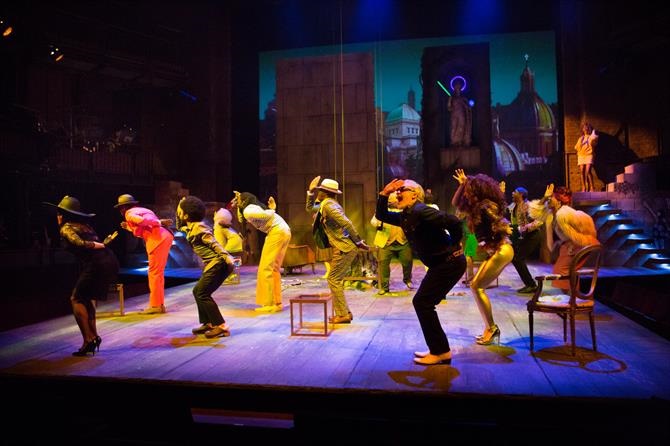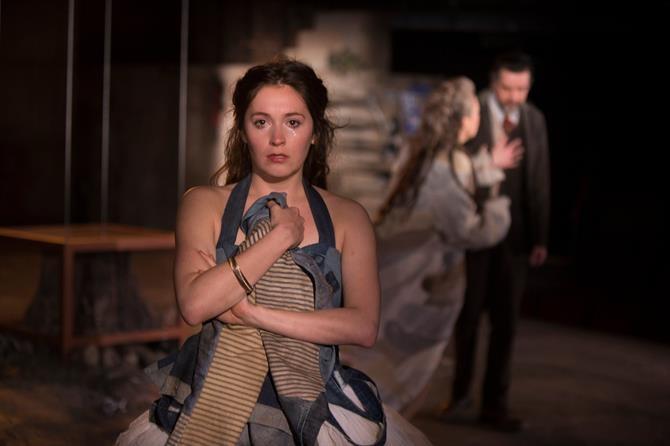“Britain is a world by itself.” It could be the slogan of the year – and rather longer, probably – but the phrase comes from Shakespeare’s late romance Cymbeline. Its Act III scene, in which Britain announces that it is breaking its allegiances to the Roman Empire, surely can’t ever have played before with quite the nuance that Melly Still’s RSC production gives it. It premiered at Stratford in May, when the big Brexit question was still open, and now reaches the Barbican with redoubled relevance.
Back in 1609, Britishness was the issue, too, but coming from the opposite direction: James VI of Scotland was new on the English throne, and the matter to hand was unifying those two worlds into a single whole. Cymbeline endows the idea of Britain with a nobility that harks back to a mythic past – the Welsh scenes of the second half – here set against the baseness of the present. “And we will nothing pay/For wearing our own noses,” that quotation continues, as the dullard Cloten taunts the protocols of negotiation, his intonations cocking a snook at the status quo in a way that could be coming right out of the mouths of UKIP.
If there’s one thing that’s gone missing from this production, it’s a sense of Shakespeare’s poetry
If Still’s vision of Cymbeline’s Britain hints at a state-of-the-nation quality, we should look out for where we’re heading: it’s a dystopian vision of a world in decay. The director has adapted the original, not least in changing the gender of its ruling tandem: Cymbeline is now a queen, rather punkily clad à la Derek Jarman, firmly played by Gillian Bevan, her consort becoming the Duke (James Clyde, borrowing bits of his wardrobe from Sherlock). It gives us one line, “A mother cruel and a step-dad false”, that certainly isn’t there in the folios. That change works quite nicely, the mother’s feelings about her two lost sons (well, a son and a daughter here) adding pathos to one strand of the many closing revelations, while Clyde’s character is now less parodic step-mother, more Jacobean plotter.
Giving that older generation a mannered quality brings home the youth of Cymbeline’s main players, and this production certainly aims for young energy, ensemble dance scenes included (pictured below), which sometimes comes at the expense of subtlety. Posthumus (Hiran Abeysekera) seems barely to have come of age, his physical slightness dominated by the greater stage presence of Innogen (Bethan Cullinane, impressive: if any character develops in the course of the play at all, it’s her). Changing the gender of Posthumus’s male servant to make her Pisania (Kelly Williams) alters the dynamic of that master-attendant relation, the result coming closer to, say, Juliet and her nurse. But it’s when the exiled Posthumus arrives in Rome that the fun really starts for Still and designer Anna Fleischle. This is a decadent, almost Eurotrash world that recalls Paolo Sorrentino’s The Great Beauty – just as Posthumus’s later bloodied tutu surely nods to Darren Aronofsky’s Black Swan. I’m not sure whether translating the words of the notional Dutchman, Frenchman and Spaniard who make up Roman society into their native tongues, with English surtitles, adds anything more than novelty; the same applies to exchanges between Roman and British leaders in Latin (although if no common language can be found for our future EU negotiations, who knows?).
But it’s when the exiled Posthumus arrives in Rome that the fun really starts for Still and designer Anna Fleischle. This is a decadent, almost Eurotrash world that recalls Paolo Sorrentino’s The Great Beauty – just as Posthumus’s later bloodied tutu surely nods to Darren Aronofsky’s Black Swan. I’m not sure whether translating the words of the notional Dutchman, Frenchman and Spaniard who make up Roman society into their native tongues, with English surtitles, adds anything more than novelty; the same applies to exchanges between Roman and British leaders in Latin (although if no common language can be found for our future EU negotiations, who knows?).
Rome offers a rise in energy levels, too, with the appearance of Oliver Johnstone’s scheming Iachimo, all white-suited, dandy languor on the outside, undiluted cynical nastiness within. If Cymbeline’s good characters might be accused of lacking some, if not all, conviction, there’s no doubting the passionate intensity with which this devil pursues victory in his wager (pictured below, from left: Oliver Johnstone, Byron Mondahl, Hiran Abeysekera). The rapier-like insistence of Iachimo’s soliloquy in his invasion of Innogen’s bedroom has a welcome dramatic verve in a production where wider effects blunt rather than illuminate the text .
 If there’s one thing missing, it’s a sense of Shakespeare’s poetry. Cymbeline may be a complex play – much more diverse and uneven than The Winter’s Tale or The Tempest – but some of its accents and intonations are richer than we find them here, especially in the first half. The emergence into the open air of Wales is very welcome: the artifice comes down a note or two, allowing the language to speak for itself which, in the delivery of Belarius and his brood, it does. Composer Dave Price’s music, coming from the upper-stage wings, has richness of atmosphere throughout but comes into its own here, as do the more organic shapes and hues of Fleischle’s design.
If there’s one thing missing, it’s a sense of Shakespeare’s poetry. Cymbeline may be a complex play – much more diverse and uneven than The Winter’s Tale or The Tempest – but some of its accents and intonations are richer than we find them here, especially in the first half. The emergence into the open air of Wales is very welcome: the artifice comes down a note or two, allowing the language to speak for itself which, in the delivery of Belarius and his brood, it does. Composer Dave Price’s music, coming from the upper-stage wings, has richness of atmosphere throughout but comes into its own here, as do the more organic shapes and hues of Fleischle’s design.
On occasion less might have been more. The Brexit allusion adds a dimension, and convinces as more than gimmick, which cannot be said of some of the production's theatrical elements. As the characters quit the stage, we’re left to ponder how relevant Cymbeline’s closing reconciliations may prove in real life – and just how long it will be before we hear anyone speaking another of the play’s uncannily apt lines, “Our kingdom is stronger than it was”, with any real conviction.















Add comment